七年级英语上册 Unit 4 My day Grammr课件 (新版)牛津版
2022七年级英语上册Unit4MydayPeriod4Grammar习题课件新版牛津版95
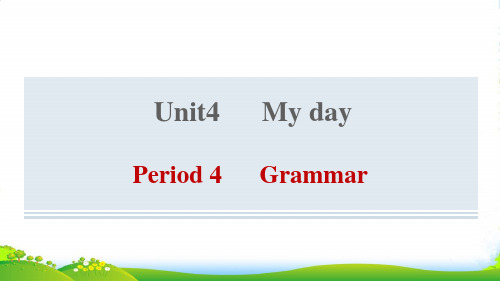
18. Mother's Day comes ____B____ the second Sunday of May. 【中考·云南】
A. in
B. on
C. at
D. for
19. He often watches TV ____D____ Sundays, but he wants to go to the cinema ________ this Sunday. 【八一中学期中】
Unit4 My day
Period 4 Grammar
习题链接
温馨提示:点击 进入讲评
课内知识•夯实基础
1 always; never
6 Thanks for
答案呈现
2 seldom; often
7 play football with; on
3 usually; sometimes 8 would like to tell; about
14. My cousin is a member of the Drawing Club. He __o_f_t_e_n__ draws after school, but not always.
15. He usually walks to work, but ___so_m__e_t_im__e_s__ he goes to work by bike.
10. 桑迪没有太多时间打网球。 Sandy does not __h_a_v_e_m__u_c_h__ti_m_e__t_o_p_l_a_y__ tennis.
1. You can drive a car at 18 years old. You can drive a car ____a_t___ ____1_8___. You can drive a car ____a_t___ ____th_e___ ___a_g_e___ ____o_f___ 18. You can drive a car __w__h_e_n__ ___y_o_u___ are 18.
牛津译林版7A Unit4 My day Grammar课件(共23张PPT)
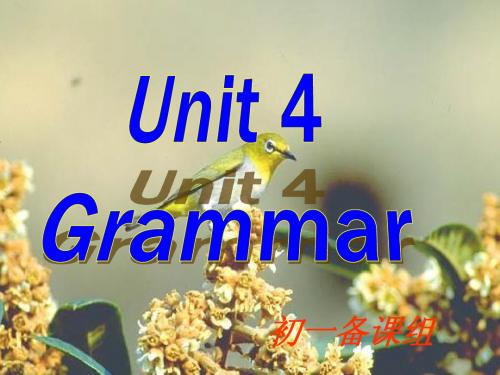
5在儿童节
6在六岁(2)
at six(years old), at the age of six 7给---写回信 write back to
would like sth, 9在秋天 in autumn 10玩得很高心have great fun
13. It is a good idea to go for a walk ____ a sunny morning.
on
15. The story happened _____ on a cold winter morning. 16. We’ll have a party ____ next week.
在早饭时
at breakfast
在13岁的时候
at 16(years old)/ at the age of 16
Tommy’s school life
in on in at on in on
Fill in the blanks with in, on or at where necessary. on Sunday. 1. We don’t go to school_______
8想要某物
11有许多时间做某事
have much time to do sth
12舞蹈课 13.去溜旱冰
dancing lessons go roller skating
学海拾贝
A. Prepositions of time
in: we use ‘in’ before _______________, parts of the day _______,seasons _______, ______. months years on: we use ‘on’ before:_____, days ______ dates at: we use ‘at’ before: _________, times of day
牛津译林版七年级上册(2024)Unit 4 School day 语言点和语法点整理
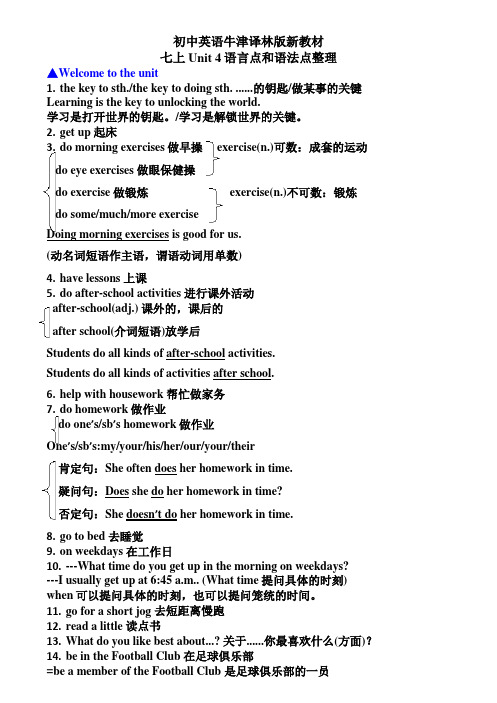
初中英语牛津译林版新教材七上Unit 4语言点和语法点整理▲Welcome to the unit1.the key to sth./the key to doing sth. ......的钥匙/做某事的关键Learning is the key to unlocking the world.学习是打开世界的钥匙。
/学习是解锁世界的关键。
2.get up 起床3.do morning exercises做早操 exercise(n.)可数:成套的运动 do eye exercises 做眼保健操do exercise 做锻炼 exercise(n.)不可数:锻炼do some/much/more exerciseDoing morning exercises is good for us.(动名词短语作主语,谓语动词用单数)4.have lessons 上课5.do after-school activities 进行课外活动after-school(adj.) 课外的,课后的after school(介词短语)放学后Students do all kinds of after-school activities.Students do all kinds of activities after school.6.help with housework 帮忙做家务7.do homework做作业do one’s/sb’s homework做作业One’s/sb’s:my/your/his/her/our/your/their肯定句:She often does her homework in time.疑问句:Does she do her homework in time?否定句:She doesn’t do her homework in time.8.go to bed 去睡觉9.on weekdays 在工作日10.---What time do you get up in the morning on weekdays?---I usually get up at 6:45 a.m.. (What time提问具体的时刻) when可以提问具体的时刻,也可以提问笼统的时间。
译林版2024版Unit 4 第3课时 Grammar(课件)-2024-2025学年七年级英语上册

Grammar
七年级牛津译林版 2024版
Revison
Lead-in
Gramma r
one
Grammar two
Pronounci ation
Practices
Summar y
Cut apart the fruit
切水果,说出水果上的单词1 个1分,炸弹单词不说,否则 扣1分。
Grandma: Good. Do you play any sport at school? Oh yes! (3) ___O__n___ Monday, I go swimming. I also play basketball (4) ___o__n___ Friday afternoon.
Sandy: Every year, we have a big basketball match (5) ____in_____ November.
Revison
Lead-in
Gramma r
one
Grammar two
Pronounci ation
Practices
Summar y
在中文里,我们习惯 先说明时间地点,再
强调做某事。
我昨天在游泳馆游泳。 我7点在学校吃早餐。 我周末在同学家玩。 我每天在家写作业。
在英语中,他们习惯 先说明做某事,再强
in
part of day morning /afternoon /evening
months January March April September
season spring summer autumn/fall winter
years 2014 2024 2034
牛津译林初中七年级上册英语 Unit 4《My day Reading 1》课件3

III. 根据所给汉语完成句子。 1. 人们说玛丽是个聪明伶俐的女孩。
People say Mary is a_c_le_v_e_r_ __g_ir_l__. 2. 我们学校的一天从八点开始。 Our _sc_h_o_o_lday_s_ta_r_t_s__a_t_8:00 every day. 3. 我们期待着在外面好好过一天。 We __w_i_sh__ to _h_a_v_e_ a great day outside.
( T ) 1. Millie likes her school very much. ( F ) 2. School starts at 8.15 at Millie’s
school.
( T ) 3. English is Millie’s favourite subject. ( F ) 4. Millie seldom chats with her friends
We read books
We practise volleyball.
Now let’s read the passage together and then finish B3 on P46
Complete the conversation between Joan and Tommy. Joan: I know your friend Millie is now at
every Saturday. 3. I __a_m__g_o_o_d__a_t_ English, for I go to
the English Club every Wednesday. 4. We must learn from ___e_a_c_h_o_t_h_e_r___. 5. The students always _h_a_v_e_a__g_o_o_d__ti_m_e_
2020牛津译林版七年级上册Unit 4《My day》(Grammar)课件

11. We’ll have one party ____ next week.
12. My friends give me some presents __a_t__
Christmas every year.
13. He got home _o_n___ the morning of the 4th last month. 14. The story happened __o_n__ a cold winter morning. 15. I never go to a party0_o%_n__ Halloween. 16. My father seldom h2as0%free time _a__t__ the weekend. 17. It sometimes snows40__%_in____ winter in Wuxi. 18. He often takes Edd6ie0%for a walk _i_n___ the evening.
3. Amy is a member of the swimming team. She u__su_a_l_l_y swims after school.
never seldom sometimes often usually always
4. Daniel doesn’t like basketball. He n_e_v_e_r_ plays it.
never seldom sometimes often usually always
How often do they exercise?
1. Simon loves playing football. He _____ plays football in the playground.
2014牛津译林版七年级上 Unit4 My day Grammar课件
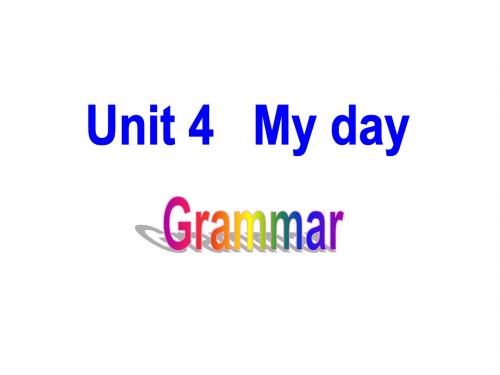
Tuesday Thursday
Saturday
Wednesday
Friday
Sunday
Can you say the names of 12 months ? 12个月的名称 What are they?
12 months in a year
January February
April July October
时间介词 in: 用在: 月份前 1. ______ 2. 3 年份前 _______
in in
October 2012 sp_________ in
4 早中晚前 _____
Fill in the blanks with “in”, “on” and “at”. on 1. Christmas Day is _________ 25 December. 2. The new school term begins ________ September. in 3. Uncle Bob visits his relatives _____ on Thanksgiving Day. 4. David and his friends practise football ______ on Sunday. 5. Tommy wants to go to see the film ______ at 6 p.m. this evening. on 6. They often go swimming ______ Friday afternoon. 7. We have a long holiday _______ summer. in in 8. My grandma likes to watch TV ____the afternoon. 9. The little boy can tell stories______ at the age of 3. in 10.I do not think the world will come to an end ____2012.
七年级英语上册《Unit 4 My day Period 2(Grammar)》测试题(无答案)(新版)牛津版

《Unit 4 My day Period 2(Grammar)》一、英汉互译1.from Monday to Friday______________ 2.做早锻炼______________3.chat with each other_________________ 4.去阅读俱乐部__________5.be very good at it____________________ 6.过得愉快______________7.at a quarter past eight_________________ 8.在下午________________9.on Wednesday afternoon_______________ 10.在操场上玩____________二、单词拼写1. The boys are in the volleyball team. They _____(训练)after school on Wednesday afternoon. 2.If you like shopping, Xidan will be your_______(最喜欢的)place.3. Millie is always the_______(第一)one to get to school.4. Every day, we do morning_______(锻炼)at school.5. Thanks for your_______ (祝愿),I will.三、单项选择( )1. We go to school_______ Mo nday_______ Friday.A. o n; andB. in; andC. from; toD. from; and( )2. She_______ chatting with her friends after school.A. too likesB. also likesC. either likesD. likes also( )3. My classmates_______ nice to me.A. are allB. all areC. both areD. are both( )4. We have PE lessons_______ Tuesday and Friday.A.on B.in C.at D./( )5. Can you play_______ or________?A. basketball; footballB. the basketball; the footballC. basketballs; footballsD. a basketball; a football( )6. We do eye exercises_______ the afternoon.A. inB. onC. atD. between( )7. The school day_______ at seven every morning.A. beginsB. is beginningC. beginD. is begins( )8. Let you and_______ good friends.A. I amB. me beC. me areD. I are( )9. My mother often_______ early in the morning.A. wakes up meB. wakes me upC. wake up meD. wake me up( )10. Tom and I_______ members of the Music Club.A. amB. isC. areD. /四、句型转换1.We sit under the tree at lunchtime.(对画线部分提问)_______ _______ _______ sit under the tree?2.I can see six oranges in the basket.(对画线部分提问)_______ _______ oranges_______ _______see in the basket?3. Millie likes reading newspapers. (改为否定句)Millie _______ _______ _______newspapers.4. Which is your favourite lesson? (同义句转换)Which lesson_______ you like_______?5. Jack goes to school five days a week. (同义句转换)Jack goes to school_______ Monday _______Friday.七、翻译句子1.我最喜欢的课是语文课和英语课。
七年级英语上册 Unit 4 My day知识点精讲(下)(新版)牛津版

7A Unit 4知识点梳理(下)课堂导入醒来wake up 出去go out吃早饭have breakfast 吃午饭have lunch吃晚饭have dinner 玩得高兴have fun起床get up 去上学go to school做早操do morning exercises 上课have lessons进行课外活动do after-school activities 看电视watch TV去睡觉go to bed 迟到be late for在上午in the morning 从周一至周五from Monday to Friday擅长be good at 许多朋友 a lot of friends对某人友好be nice to sb. 课后after class彼此聊天chat with each other 在操场上in the playground去图书馆go to the library 在下午in the afternoon有一个阅读俱乐部have a Reading Club 读书read books在周二on Tuesday 喜欢打排球like playing volleyball在校排球队in the school volleyball team 在周三下午on Wednesday afternoon在晚上in the evening 互相,彼此each other过得愉快,玩得高兴have a good time 最忠心的祝福best wishes去上舞蹈课go to dancing lessons 去溜旱冰go roller skating去野餐go on a picnic 每月一次once a month对···有好处be good for 太多的too much为···准备好get ready for sth. 去阅读俱乐部go to the Reading Club知识点梳理一.词汇&短语:WORDS&PHRASES1. Children in China start school at 6 years old.1. start school 意为“开始上学”我8岁开始上学。
Unit 4Section A(Grammar Focus)(课件)七年级英语上册(人教版2024)

因为数学有趣所以我喜欢它。 Because Math is interesting, I like it. = Math is interesting, so I like it.
3. It takes us into a world full of 1,2,3 and X,Y,Z…It's difficult but useful!
/'ju:sfl/ adj. 有用的;有益的
4. In this class, we can play football and basketball.
A.and
B.but
C.or
D.so
C 6.We’d better be happy every day ________ life is so short.
D: ...
Description words :
fun
relaxing
interesting
exciting(令人兴奋 的) useful(有用的) important(重要的) easy(简单的)
…
grammar n. 语法 Grammar Focus
focus n. 聚焦
We are going to learn something about how to use conjunction and, but,
grammar 连词 so
(4)so :表示因果关系,连接表示因果的句子。
在一个句子中不能同时出现because和so.
These buildings were over 50 years old, so they were not strong enough. 这些建筑物已有50多年的历史,因此不够坚固。
沪教牛津版七年级英语上册课件Unit 4 Listening Grammar

What are the differences between the four seasons in China and those in Australia?
Grammar
A Using adjectives before nouns
We use an adjective before a noun to describe a thing or a person.
It is healthy to eat more vegetables. 多吃蔬菜是有益健康的。
形式 It was +adj.+ to do... 真正
主语
主语
不定式短语作主语,可直接放 句首,但更常放在谓语之后,
而用it作形式主语。
P51 Here are some pictures of different seasons. Write a caption for each
c. She is a beautiful girl. 她是一个漂亮的女孩。
1. 名词后+y变形容词,若该名词为重读闭音节则双写后面 的辅音字母再加y。
sun — sunny snow — snowy wind — windy rain — rainy cloud — cloudy fog — foggy
2. 加后缀ful变形容词,表示充满……的,具有……性质的。
help — helpful beauty — beautiful use — useful thank — thankful care — careful colour — colourful
1. Winter is very cold. 2. In autumn, the weather is cool and dry. 3. It will be sunny tomorrow. 4. Tom is very clever. 5. That box is very heavy.
七年级英语上册 Unit 4 My day Grammar(2)教案 (新版)牛津版-(新版)牛津版

So yousometimeschat on the Internet.
Adverba of frequency tell you how often things happen .
2. Read the graph in Part B
Do youoftenchat on the Internet?
How oftendo you write emails?
Oh, you chat with friends on the Interner every day.
So youalwayschat with friends on the Internet./
Unit 4 My day
课题
7A Unit4
My day
总课时
8
第5课时
Grammar(2)
撰稿人
备课时间
授课时间
教学目标
To understand and correctly use adverbs of frequency.
教学重点
To use“never/seldom/sometimes/often/usually/always”correctly.
4.Where can we put an adverb of frequebcy in the sentence?
e.g.I’m never late for school.
Iam always happy.
He is always nice to us.Etc.
Step3. Exercises and homework
2.Check out.
牛津译林版7A Unit4 My day Grammar课件(共20张PPT)
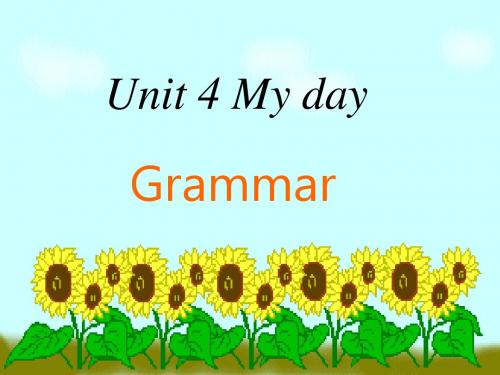
• • • • • • • • • • • •
7.每周一早上我们都会开校会。 on Monday _______. morning Wehave a school meeting _____ 8.她四岁的时候就会跳舞了。 She could dance _____ at the age of 4. 9.我们的第一节课开始于8点整。 at 8:00 o'clock. Our first lesson starts ___ 10.他在一个寒冷的早上离开了家。 He left(/e/) home ____ on a cold morning. 11.我们喜欢在午饭的时候看新闻。 We like watching news _____ at lunchtime. 12.我们周日没有课。 We have no lessons ______ on Sunday.
Free talk Prepositions of time 时间介词
I go to school at 6:20 in the morning. We have English lessons on Mondays. We have Chinese lessons in the morning. We do our homework in the evening.
时间介词"on"的用法
• lie has breakfast at seven o'clock.
at:在几点
• 2.Children in China start school at 6 years old. at:在几岁 • 3.My father reads newspapers at breakfast. at:一日三餐 • 4.They go shopping at Christmas. • 5.We visit friends at Spring Festival.
2023牛津译林版七年级上册Unit 4《My day》(Reading I)课件

After-school activities
Paragraph 2
When does Millie’s school start?
At eight in the morning.
They always chat with each other or play in the playground.
read books
do after-school activities
practise playing volleyball
chat with each other
have a good time
Which is Millie’s favourite subject?2. What does Millie like doing?
a lot of
chat
Reading CБайду номын сангаасub
Tuesday
Thursday
J: Does Millie like sports?T: Yes. She likes playing volleyball. She’s in the school _____________. They _______ after school on ___________________.
volleyball team
practise
Wednesday afternoon
Try to retell Millie’s day
Time
Events
8:00 a.m.
do morning exercises
Millie likes her school very much.
2. School starts at 8:15 at Millie’s school.
牛津译林版七年级英语上册《nit 4 My day Grammar: Prepositions of time . 》赛课导学案_13
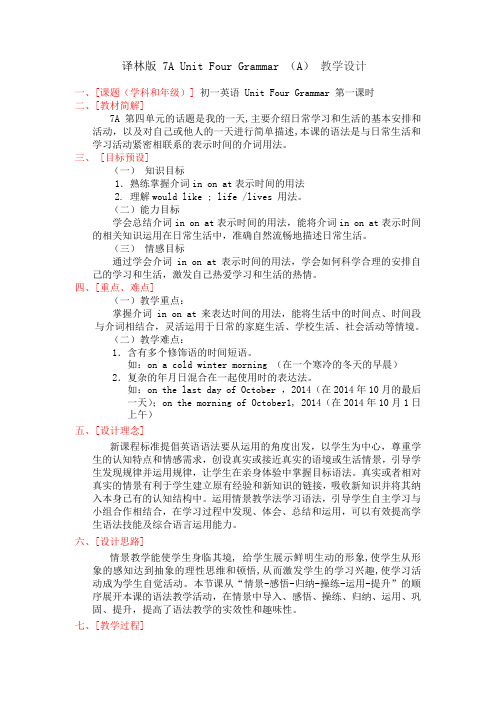
译林版 7A Unit Four Grammar (A)教学设计一、[课题(学科和年级)]初一英语 Unit Four Grammar 第一课时二、[教材简解]7A第四单元的话题是我的一天,主要介绍日常学习和生活的基本安排和活动,以及对自己或他人的一天进行简单描述,本课的语法是与日常生活和学习活动紧密相联系的表示时间的介词用法。
三、 [目标预设](一)知识目标1.熟练掌握介词in on at表示时间的用法2.理解would like ; life /lives 用法。
(二)能力目标学会总结介词in on at表示时间的用法,能将介词in on at表示时间的相关知识运用在日常生活中,准确自然流畅地描述日常生活。
(三)情感目标通过学会介词in on at表示时间的用法,学会如何科学合理的安排自己的学习和生活,激发自己热爱学习和生活的热情。
四、[重点、难点](一)教学重点:掌握介词in on at来表达时间的用法,能将生活中的时间点、时间段与介词相结合,灵活运用于日常的家庭生活、学校生活、社会活动等情境。
(二)教学难点:1.含有多个修饰语的时间短语。
如:on a cold winter morning (在一个寒冷的冬天的早晨)2.复杂的年月日混合在一起使用时的表达法。
如:on the last day of October ,2014(在2014年10月的最后一天);on the morning of October1, 2014(在2014年10月1日上午)五、[设计理念]新课程标准提倡英语语法要从运用的角度出发,以学生为中心,尊重学生的认知特点和情感需求,创设真实或接近真实的语境或生活情景,引导学生发现规律并运用规律,让学生在亲身体验中掌握目标语法。
真实或者相对真实的情景有利于学生建立原有经验和新知识的链接,吸收新知识并将其纳入本身已有的认知结构中。
运用情景教学法学习语法,引导学生自主学习与小组合作相结合,在学习过程中发现、体会、总结和运用,可以有效提高学生语法技能及综合语言运用能力。
七年级英语上册Unit4Myday知识点归纳素材(新版)牛津版
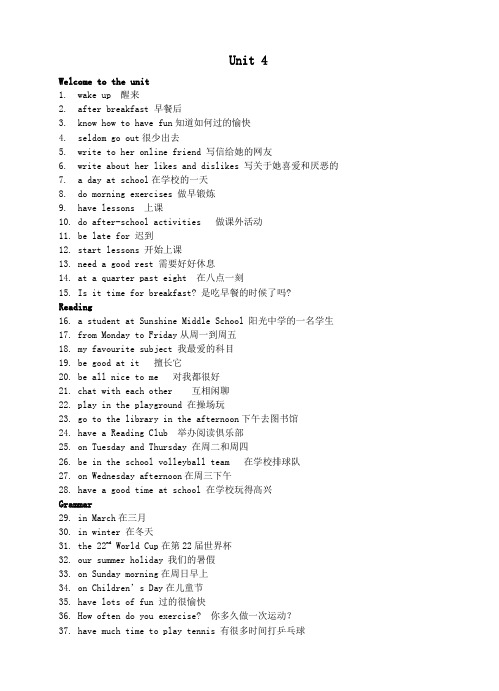
Unit 4Welcome to the unit1.wake up 醒来2.after breakfast 早餐后3.know how to have fun知道如何过的愉快4.seldom go out很少出去5.write to her online friend 写信给她的网友6.write about her likes and dislikes 写关于她喜爱和厌恶的7. a day at school在学校的一天8.do morning exercises 做早锻炼9.have lessons 上课10.do after-school activities 做课外活动11.be late for 迟到12.start lessons 开始上课13.need a good rest 需要好好休息14.at a quarter past eight 在八点一刻15.Is it time for breakfast? 是吃早餐的时候了吗?Reading16.a student at Sunshine Middle School 阳光中学的一名学生17.from Monday to Friday从周一到周五18.my favourite subject 我最爱的科目19.be good at it 擅长它20.be all nice to me 对我都很好21.chat with each other 互相闲聊22.play in the playground 在操场玩23.go to the library in the afternoon下午去图书馆24.have a Reading Club 举办阅读俱乐部25.on Tuesday and Thursday 在周二和周四26.be in the school volleyball team 在学校排球队27.on Wednesday afternoon在周三下午28.have a good time at school 在学校玩得高兴Grammar29.in March在三月30.in winter 在冬天31.the 22nd World Cup在第22届世界杯32.our summer holiday 我们的暑假33.on Sunday morning在周日早上34.on Children’s Day在儿童节35.have lots of fun 过的很愉快36.How often do you exercise? 你多久做一次运动?37.have much time to play tennis 有很多时间打乒乓球38.a member of the swimming team游泳队的一员39.go to her dancing lessons去上她的舞蹈课40.dance for half an hour 跳半个小时舞蹈41.go roller skating去溜旱冰Integrated skills & Study Skills42.welcome to the match 欢迎来比赛43.a volleyball match between Sunshine Middle School and Moonlight Middle School阳光中学与月光中学之间的一场排球赛44.go there by bus 乘车去那儿e and watch the game去看比赛46.good luck祝好运47.Good luck to sb. with sth祝某人某事好运48.about twice a month 大约一个月两次49.visit the museums 参观博物馆50.go on picnics with my family 和我的家人去野餐51.go on a picnic 去野餐52.read the following words 读下面的单词53.pay attention to 注意54.read the words below 读下面的单词55.a car in the park 公园里的一辆车56.a girl in a skirt 穿短裙的女孩57.a nurse at work 在工作的护士58.cook at noon 正午做饭59.look at the book 看这本书60.walk on the wall 在墙上走61.clean the street 打扫街道62.get ready for breakfast 准备吃早饭63.after dinner 晚餐后Main task & Check out64.read about Millie’s likes and dislikes 读关于米莉的喜爱与厌恶的65.be good for us 对我们有益处66.help us get ready for the day帮助我们为一天做好准备67.cannot play it well不能玩的很好68.learn a lot about the world学习许多关于世界69.be fun 是有趣的70.have too much homework 有太多家庭作业71.love lessons at school 爱学校的课程72.have too much homework 有太多的家庭作业73.talk about sth with sb.和某人讨论某事e sth. to do sth.用某物做某事75.find more words 找到更多的单词76.need to do sth 需要去做某事77.spend more time on sth. 花更多时间去做某事78.put up the posters on the wall把海报贴在墙上79.read sth. carefully细心读某物80.remember to do sth明白去做某事。
Unit4 Grammar教案 牛津译林版初中英语七年级上册

Unit 4 My dayGrammar教案(一)I. Teaching aims and learning objectivesBy the end of the lesson, students should be able to:1. use prepositions to talk about time correctly;2. use the adverbs of frequency correctly;3. grasp the usage of “how often”;4. use these items of grammar to talk about their dai ly life.II. Teaching contents1. New words and expressions: would, would like, life, all the best, roller skating2. New structure: How often do they exercise?III. Focus of the lesson and predicted area of difficulty1. Know better about some usages of the prepositions of time;2. Tell the difference between “how often” and “how many times”.IV. Teaching proceduresA. Prepositions of timeStep 1 Presentation1. Find out the expressions which should be put after “in/on/at” one by one.2. Read the expressions together.3. Find out more similar expressions.4. Work out the rules.(1) in: in the evening (part of day), in December (months), in 2013 (years), in winter (season)(2) on: on Sunday, on December 31st (days & dates), on the evening of July 4th, on Monday afternoon (parts of a specific day), on Children’s Day (specific holidays or days)(3) at: at seven, at noon, at lunchtime (time of day), at (the age of) 16 (age), at the Spring Festival (specific holidays or festivals), at the weekend【设计意图:通过设计新生找教室的情境,让本来枯燥的语法稍显活泼些。
牛津译林版7AUnit4MydayGrammar共12张PPT

Tuesday and Thursday.
• Millie likes playing volleyball. She practises playing volleyball after
6. 我上学从来不迟到.
I am _n__e_v_e_r__ late for school.
频率副词在句中的位置:
1. 频率副词用在be动词后。
It is usually hot in summer. 夏天天气通常是热的。 2. 频率副词用在实意动词前。
My father usually walks home. 我的父亲经常步行回家。 3. 频率副词用在助动词与实意动词之间。
I love sports. I am good at playing football. I often play it with my friends _o_n__ Saturday afternoon. We have a football match __in___ autumn every year. This year, it is __o_n__ 15 November. My friends and I always have great fun then.
I don’t often go swimming. 我不经常游泳。
频率副词位置记忆口诀: 实前 Be后
How often是对表示频度副词 的时间状语的提问,可翻译为 “多久(一次)”。
➢How often do they exercise?
1.Simon loves playing football. He o_f_t_e_n_ plays football in the playground.
- 1、下载文档前请自行甄别文档内容的完整性,平台不提供额外的编辑、内容补充、找答案等附加服务。
- 2、"仅部分预览"的文档,不可在线预览部分如存在完整性等问题,可反馈申请退款(可完整预览的文档不适用该条件!)。
- 3、如文档侵犯您的权益,请联系客服反馈,我们会尽快为您处理(人工客服工作时间:9:00-18:30)。
Grammar
Lead-in
It is very cold in winter.
Children’s Day is on June 1st.
They do morning exercises at 8 o’clock.
It is very cold in winter. Children’s Day is on June 1st. They do morning exercises at 8 o’clock
100% 80% 60% 40% 20% 0%
never seldom sometimes often usuallyalways
频度副词 (频率由高到低): always (总是) usually(通常) often (经常) sometimes(有时) seldom(很少) never(从不)
(in用于表示上午、下午、晚上、某月、季 节和某年等时间)
in the first week of this term 这学期的第一周
on: we use ‘on’ before:_d_a_y_s_, _sp__e_c_ia_l_d__a_y_s, _sp__e_c_ia_l_h__o_li_d_a_y_s___, _d_a_t_e_s___.
(at 用于表示具体的钟表上的时间、 年龄、一日三餐、部分节日等) at dawn/daybreak 在黎明时 at noon 在中午 at midnight 在午夜 at the weekend/at weekends 在周末
Fill in the blanks with “in” “on” “ at”.
America _a_t_ the age of 20. 5. We have a Maths lesson _a_t 7:40 _o_n_
Monday morning.
6. Birds fly to the south(南方) _in__ autumn. 7. My father usually goes fishing _a_t the weekend. 8. It is good to go for a walk _o_na sunny morning. 9. He always goes to the library o__n_ Mondays. 10. I like playing tennis _i_n_ the afternoon, but I
will play basketball _____ this afternoon.
11. The boy gets home o__n a cold winter morning.
12. We have a party ___ New Year’s Day.
Adverbs of frequency (频率副词) presentation
我们可以使用频度副词来表示做某件事的频率。
1. My aunt cleans the room every day. She always does the cleaning.
2. My uncle goes to the Singing Club five times a week. He usually sings songs after work.
(on用于表示星期几、日期和具体某一 天的上午、下午或晚上等时间。) 在星期一下午 on Monday afternoon
在一月四日晚上 on the evening of January 4th at Christmas 在圣诞节 ’ before:_ti_m__e_o_f_d_a_y_, _a_g_e__.
3. My cousin loves drawing. He often draws pictures in the park.
4. Sometimes he goes to the library to look for some information.
5. Kitty is a good dancer. She seldom eats sweet snacks. 6. My cousin is a good boy. He never plays tricks
Prepositions(介词) of time
in: we use ‘in’ before:_p__a_rt_s_o__f _th_e__d_a_y_, __m_o_n_t_h_s__, _se_a_s_o_n_s_, _ye_a_r_s_.
on: we use ‘on’ before:__d_a_y_s, _d_a_te_s_
on his Dad.
Look and fill in the blank
SMDAKiamainlinltdoyitienye_l__l_i_k__e__s_gds_owpaeplnisamlcyarisonylsgabfloe.faStordehotsrmbetkbsai_acnal_tlhlti_lano._fnogtl.de.Srahnscech’essonoaolf.tevrery gsocohdooalt. it.
_sp_e_c_i_a_l_h_o_l_id_a_y_s__, _d_a_t_e_s__. at: we use ‘at’ before __ti_m__e_o_f_d_a_y__,
_a_ge__.
in: we use ‘in’ before _p_a_r_t_s_o_f_t_h_e_d__a_y__, m__o_n_t_h_s_, _se_a_s_o_n_s_, _ye_a_r_s_.
1. Halloween party is _o_n_ the evening of
October 31st.
2. I was born i_n_ 1990. And my birthday is o_n_
May 16th . 3. We’ll have a party ____ next week. 4. I’m good at English. I want to go to
